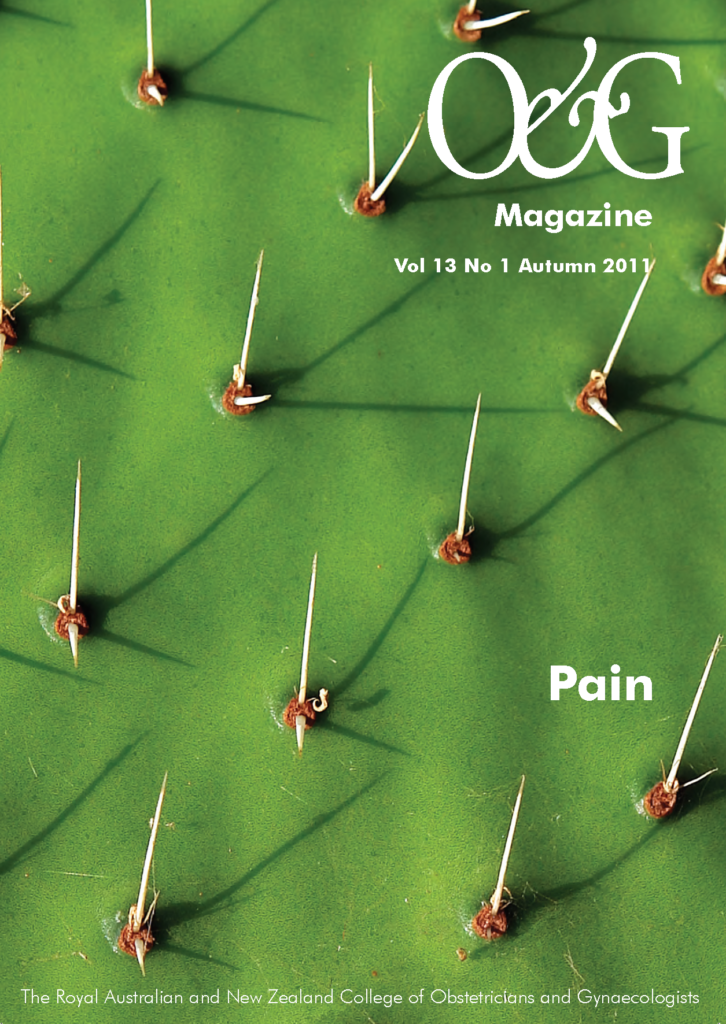For the broader O&G Magazine readership, balanced answers to those curly-yet-common questions in obstetrics and gynaecology.
A 25-year-old woman with a history of endometriosis complains of long-term variable bowel symptoms that are aggravated by eating bread. There is no bleeding from the bowel, the symptoms have been present for some time without change and her dysmenorrhoea is no longer a problem. She asks you, ‘Is this endometriosis or should I go gluten free?’
When presented with this senario, a number of conditions are possible culprits. Therefore, the best approach is to answer the following exploratory questions.
Does she have endometriosis involving the bowel?
Bowel symptoms are common in women with endometriosis, but this does not mean that there is endometriosis in or near the bowel wall. A study of 290 women with endometriosis in an advanced centre, by Maroun et al1, found that while 90 per cent had bowel symptoms, only 7.6 per cent had endometriosis involving the bowel wall. Pain opening her bowel at period time or nodules palpable in the pouch of Douglas would be more suggestive
of endometriosis.
Does she have coeliac disease?
One per cent of Caucasians have coeliac disease, with up to 75 per cent of cases remaining undiagnosed. A ‘coeliac screen’ blood test will pick up 90 per cent of cases, provided that she is currently eating a normal gluten-containing diet. Tests are negative on a gluten-free diet. If she has already started a gluten-free diet, options include the following:
- Resuming gluten for at least six weeks before a coeliac screen. Most women will not be prepared to do this, as they know their symptoms will recur.
- Genetic screen for coeliac disease. If she is positive for DQ2 or DQ8 (30 per cent of Caucasians) then it is genetically possible for her to develop coeliac disease, but she may not have the disease. If she is negative for DQ2 and DQ8 then coeliac disease can be excluded. In other words, the test is only useful if it is negative.
A woman with coeliac disease requires a life-long completely gluten-free diet. Just cutting down on wheat is insufficient for long-term health.
Does she have fructose malabsoption?
This is the most likely diagnosis. Fructose absorption from the small intestine is variable. In people who absorb fructose slowly, it reaches the large bowel unabsorbed and is fermented by bacteria to hydrogen, methane and irritating substances that cause pain or aggravate an irritable bowel. Fructose absorption in the small intestine is enhanced by glucose. Fruits with a higher glucose to fructose ratio cause fewer problems than fruits with relatively less glucose. Wheat is a fructan, which means that it releases large quantities of fructose in the gut. A woman with fructose malabsorption requires a low-wheat rather than gluten-free diet. By going gluten free she has eliminated wheat from her diet. A low-wheat diet is much easier to maintain than going completely gluten free.
Other foods that can cause similar symptoms due to slow small bowel absorption are lactose, polyols (some natural foods and artificial sweeteners), or raffinose/galactans (Brussels sprouts, broccoli, beans). These types of foods are sometimes called FODMAPs. Best management for irritable bowel syndrome (IBS) may be a global diet low in all these types of foods.2,3
Consider the following courses of action:
- Recommending a diet that is low wheat. There is a more detailed explanation of the management of bloating and/or IBS in Endometriosis and Pelvic Pain.5
- Breath tests for malabsorption of carbohydrates – including fructose, lactose, polyols, raffinose and galactans – if the diet issues are more complex.
- Referral to a dietitian.
- Recommending The Low FODMAP diet, Shopping Guide.4
Is there a neuropathic component to her bowel symptoms?
Usually there is, especially with the history of endometriosis. Neuropathic sensitisation of the bowel means that it overreacts to relatively minor dietary indiscretions. By reducing dietary aggravators, the underlying condition of neuropathic bowel sensitivity becomes less troublesome, but is not cured.
Treatment options to decrease bowel sensitivity include:
- Amitriptyline: 5–10 mg early evening, especially if there is a feeling of being bloated. This is the cheapest, easiest option.
- Iberogast, a herbal preparation from chemists: 20 drops twice daily drunk in warm water like a tea.
- Mintec or peppermint tea.
In summary
- Exclude a pelvic mass with vaginal examination or ultrasound.
- A coeliac screen blood test should be performed before any change in diet. For borderline results, request a coeliac genetic screen or refer to a gastroenterologist for endoscopy.
- Recommend a low-wheat rather than gluten-free diet unless coeliac disease is present. Consider involving a dietitian.
- Treat the ‘sensitised’ bowel: low-dose amitriptyline, iberogast or mintec.
- Laparoscopy only for specific symptoms suggestive of endometriosis involving the bowel, such as pain opening her bowel at period time. Endometriosis lesions in this area require advanced excisional techniques. If you are unable to offer advanced excisional surgery, then this patient should be referred to an advanced centre. Extra ‘diagnostic’ or ‘cautery only’ laparoscopies should be avoided.
- Refer to a gastroenterologist for ‘red flag’ symptoms such as PR bleeding, fever, weight loss, steatorrhoea.
References
- Maroun P, Cooper MJ, Reid GD, Keirse MJ. Relevance of gastrointestinal symptoms in endometriosis. Aust N Z J Obstet Gynaecol. 2009 Aug;49(4): 411-4.
- Gibson PR, Shepherd S. Evidence-based dietary management of functional gastrointestinal symptoms: The FODMAP approach. Journal of Gastroenterology and Hepatology. 25;2: 252-258 Feb 2010.
- Goldstein, R, Braverman D, Stankiewicz H. Carbohydrate malabsorption and the effect of dietary restriction of irritable bowel syndrome and functional bowel complaints. Isr Med Assoc J. 2000 Aug;2(8): 583-7.
- Shepherd, S. The Low FODMAP diet, Shopping Guide. 5th Ed. Melbourne: Shepherd Works; 2010. Available from http://www.shepherdworks.com.au .
- Evans S, Bush D. Endometriosis and Pelvic Pain. Available from: http://www.drsusanevans.com or http://www.nzendo.co.nz .






Leave a Reply